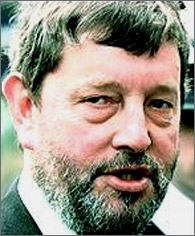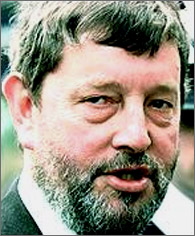Britain's Home Secretary David Blunkett has announced on Tuesday the most radical overhaul of the sex offence laws for 100 years. Many rules prohibiting gay sex acts will be swept away, while protections against rapists, paedophiles and other perverts will be tightened.

Home Secretary David Blunkett
The changes will replace the Sexual Offences Act 1956, which the Home Office says is based on 19th-century law. Mr Blunkett said: "Much of it belongs in an age before the light bulb or motor car yet we now live in a world of global communications… We must have laws that are fit for the 21st century, that reflect today's society and attitudes and provide effective protection against today's crimes."
Laws that prevent gay men from engaging privately in sexual practices legal for heterosexuals will finally be abolished; although according to The Independent, the Command Paper was coy in making no specific reference to the repeal of the offence of buggery, included in the 1956 Act which "criminalises consensual sexual activity in private between men, which would not be illegal between heterosexuals or between women".
Gay sex in a public place and "cottaging" - when gay men meet in public places for sex will however remain an offence - and will now apply to both sexes and carry a maximum six-month penalty.
The paper said: "Sexual activity in public that offends, irrespective of whether the people engaging in the activity are heterosexual or homosexual, will remain criminal."
The law would however not criminalise people of both sexes who have sex in an isolated place outdoors where they would not expect to be interrupted, or those who kiss or cuddle in private.
Mr Blunkett said: "What people do in private is their own business, but what they do in public clearly affects others. Our intention is to send a clear signal about what is unacceptable behaviour and ensure the police and prosecuting authorities have the tools to tackle it."
Other major changes/new laws include:

Home Secretary David Blunkett
Defendants accused of rape will have to be able to show they took "reasonable action" to ensure the other person consented to sex. Under the sections of the white paper on rape, defendants will not be able to claim a victim consented if he or she was threatened, abducted, unconscious through drink or drugs, or unable to communicate. There will also be a new offence of administering a drug with intent to commit a sex crime, which will carry a maximum penalty of 10 years, as well as an end to anonymity for rape defendants.
Children
Adults will be punished for persuading children to undress, closing a previous loophole in the law allowing pedophiles to exploit victims sexually without touching them. A new offence of grooming will be introduced to prosecute pedophiles who pose as children in internet chat rooms to dupe them into meeting. The new laws will be applied to every aspect of life, not just online, and will carry a maximum five-year penalty.
A further offence of an adult committing a sex act with a child will cover anyone over 13 but under 16. Children under 13 will not be capable in law of giving consent to any form of sexual activity; therefore any sexual intercourse with a person under 13 would be considered rape.
Vice Trade
A new offence of commercial sexual exploitation of a child will introduce tough penalties for people who use child prostitutes. Buying the sexual services of someone under 13 will be punishable by a life sentence, and having sex with prostitutes of 16 or 17, over the age of consent, will carry a potential term of seven years. While anyone who traffics people for sexual exploitation may face a 14-year prison sentence.
New Offence
A new offence of voyeurism will address photographers and others who secretly install "peepholes" or cameras to spy on others when they "had a reasonable expectation of privacy".
